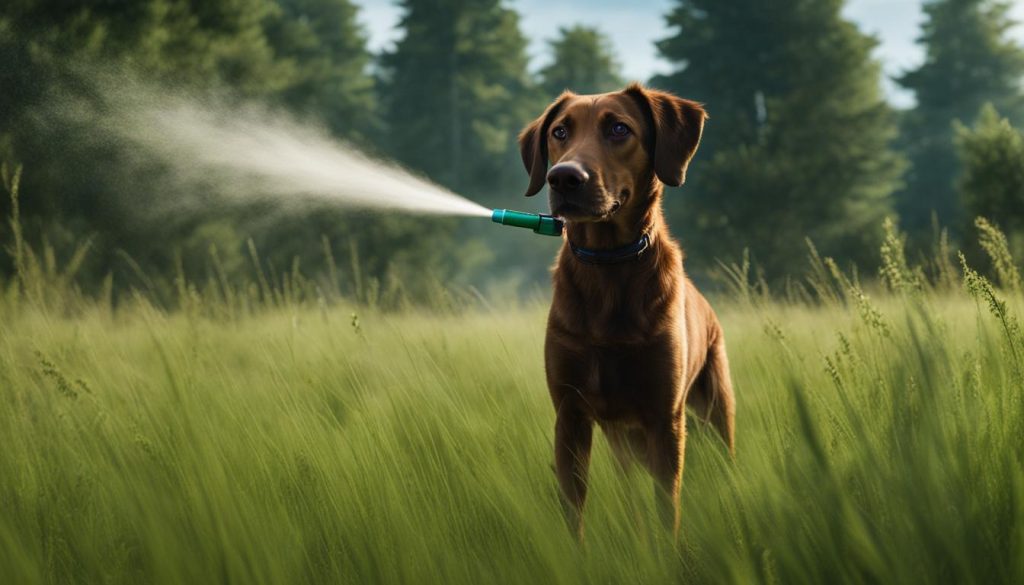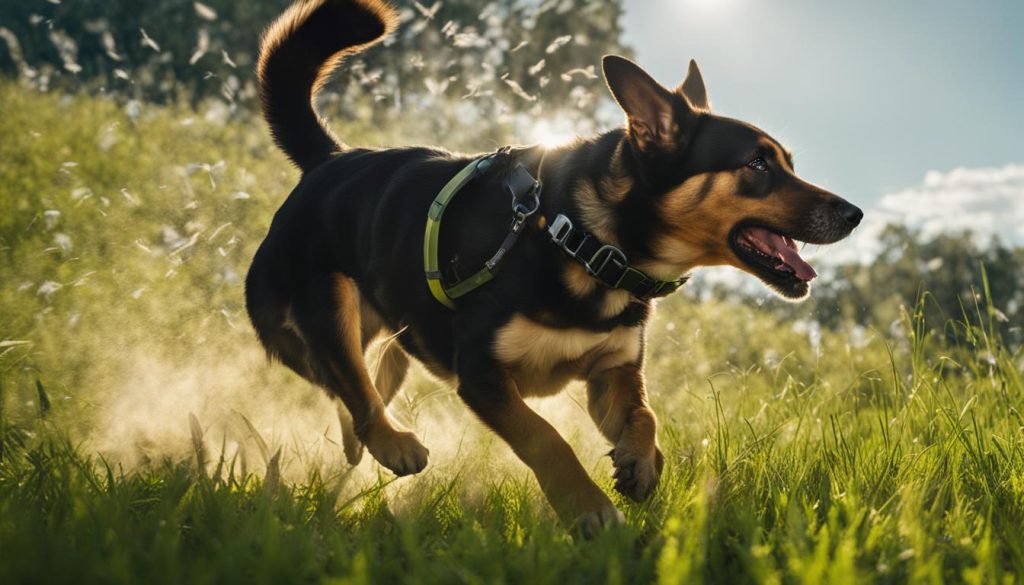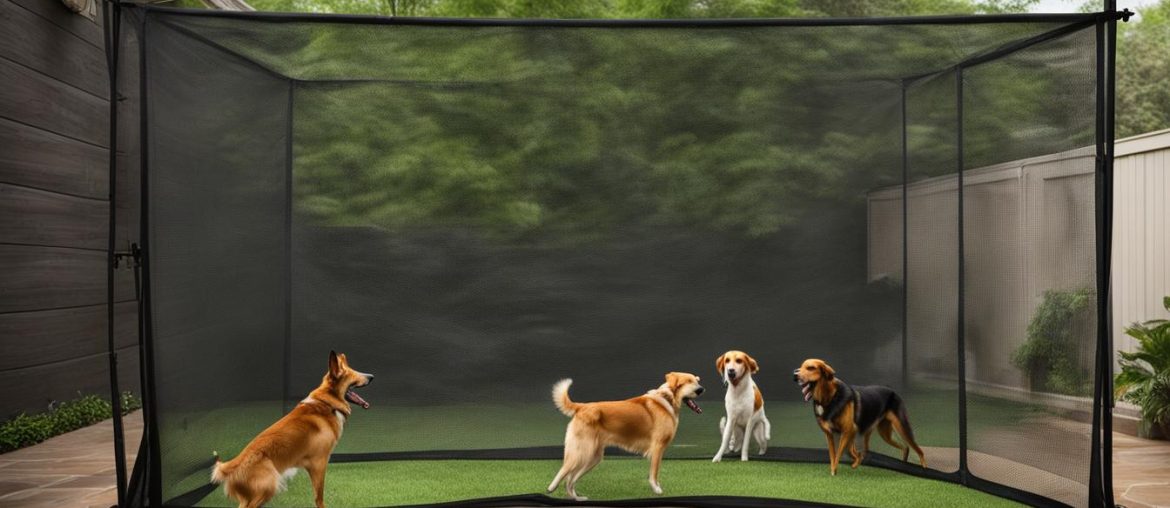As a pet owner, I often wonder about the risks my furry friend faces. One question that frequently comes to mind is, “Do mosquitoes bite dogs?” The answer is yes—mosquitoes can indeed bite dogs, just like they bite humans. However, the signs of mosquito bites on dogs may not be as obvious, making it crucial for pet owners to be aware of the risks and take necessary precautions.
When mosquitoes bite dogs, they can transmit diseases, with heartworm disease being the most significant concern. Please be aware that while the bites themselves may not cause significant discomfort to dogs, the diseases they carry can have severe health implications. Therefore, protecting our canine companions from mosquito bites becomes essential.
To help you understand the impact of mosquito bites on dogs and take the necessary steps to safeguard your furry friend, this article will delve into various aspects, from recognizing signs of mosquito bites to preventing mosquito-borne diseases. You’ll also discover natural mosquito repellents for dogs and dog-safe mosquito control measures.
Key Takeaways:
- Mosquitoes can bite dogs, transmitting diseases and posing health risks.
- Signs of mosquito bites on dogs include excessive licking, chewing, or scratching.
- Heartworm disease is a major concern associated with mosquito bites in dogs.
- Using dog-safe mosquito repellents and creating a mosquito-free environment are crucial preventive measures.
- Natural mosquito repellents, regular veterinary check-ups, and maintaining clean living spaces can help protect dogs.
What Do Mosquito Bites on Dogs Look Like?
Mosquito bites on dogs may not be easily noticeable, but there are signs to look out for. Dogs may exhibit behaviors such as sudden licking, chewing, or scratching at a particular spot where they have been bitten by a mosquito. Raised, red welts can also be found on a dog’s skin, especially in areas like the back or flank. It is important for pet owners to observe their dogs for any signs of mosquito bites.
According to veterinarian Dr. Lisa Johnson, “When a dog is bitten by a mosquito, it can cause irritation and discomfort. Some dogs may develop an allergic reaction to the mosquito saliva, leading to more severe symptoms such as swelling, redness, and even hives.” It is crucial to identify and address mosquito bites on dogs promptly to prevent further discomfort and potential complications.
To visually illustrate the signs of mosquito bites on dogs, refer to the table below:
| Signs of Mosquito Bites on Dogs | Description |
|---|---|
| Excessive licking, chewing, or scratching at a specific spot | Dogs may display discomfort and irritation due to the mosquito bite. |
| Raised, red welts on the skin | Mosquito bites can cause visible red bumps, similar to those on humans. |
| Swelling and redness | In some cases, mosquito bites can lead to localized swelling and redness. |
It is essential for pet owners to be vigilant and proactive in identifying mosquito bites on their dogs. Prompt attention and appropriate care can help alleviate discomfort and prevent potential complications.
How Can Mosquito Bites Affect My Dog’s Health?
Mosquito bites on dogs can have serious health implications. The most significant risk is the transmission of mosquito-borne diseases, with heartworm disease being the primary concern. Mosquitoes infected with heartworm larvae can bite a dog, transmitting the larvae into their bloodstream. Over time, these larvae develop into worms that primarily reside in the heart and lungs, causing damage to these vital organs.
Heartworm disease can lead to severe health issues in dogs, including coughing, difficulty breathing, fatigue, weight loss, and even heart failure. If left untreated, it can be fatal. Therefore, it is essential to protect dogs from mosquito bites and the potential transmission of heartworm disease.
Mosquito bites can also transmit other diseases to dogs, although they are less common. These diseases include Zika virus, West Nile virus, and Chikungunya virus. While the incidence of these diseases in dogs is relatively low, it is essential to be aware of the risks and take preventive measures to keep dogs in good health.
To summarize, mosquito bites on dogs can lead to the transmission of mosquito-borne diseases, especially heartworm disease. Protecting dogs from mosquito bites not only helps prevent heartworm disease but also reduces the risk of other mosquito-borne illnesses. By taking necessary precautions and providing proper protection, pet owners can ensure their dogs’ well-being and minimize the health risks associated with mosquito bites.
Soothing Mosquito Bite Itch on Dogs

Mosquito bites on dogs can cause itchiness and discomfort. Providing relief for your furry friend is essential to prevent excessive scratching, which can lead to skin irritation and potential infection. Several dog-friendly itch relief products can help soothe mosquito bite itch and promote healing.
An effective option is a topical itch-relieving spray or lotion specifically formulated for dogs. These products provide targeted relief by reducing inflammation and soothing the affected area. They often contain ingredients like aloe vera, oatmeal, or chamomile, which have soothing properties that alleviate itchiness.
Another method to soothe mosquito bite itch is by using a dog shampoo designed to relieve itchiness. These shampoos typically contain ingredients like hydrocortisone or tea tree oil, which can provide temporary relief from itching and irritation. It is important to carefully follow the instructions on the product to ensure proper use and avoid any adverse reactions.
When using itch relief products, it is crucial to observe your dog’s behavior and monitor for any signs of improvement or adverse reactions. If the itching persists or worsens despite the use of these products, it is recommended to consult with a veterinarian for further guidance.
“Applying a dog-friendly itch relief product can help alleviate discomfort caused by mosquito bites on dogs and prevent further complications.”
Table: Dog-Friendly Itch Relief Products
| Product | Description | Active Ingredients |
|---|---|---|
| Relief Spray | A spray formula that provides instant relief from mosquito bite itch. | Aloe vera, chamomile |
| Itch-Relieving Lotion | A lotion that soothes irritated skin and reduces itchiness. | Oatmeal, hydrocortisone |
| Anti-Itch Shampoo | A shampoo that relieves itchiness and cleanses the skin. | Tea tree oil, hydrocortisone |
Is It Safe to Use Bug Spray on Dogs?

When it comes to protecting our beloved pets from mosquitoes, it’s important to choose safe and effective methods. Many pet owners may wonder if using bug spray meant for humans is a viable option. However, it is essential to note that bug sprays designed for humans often contain ingredients that can be toxic to dogs. DEET, a common active ingredient in human bug sprays, can cause adverse reactions in dogs such as vomiting, excessive drooling, and even seizures. Therefore, it is not safe to use bug spray meant for humans on dogs.
Fortunately, there are dog-safe mosquito repellents available on the market. These products are specifically formulated to repel mosquitoes without harming dogs. They typically contain ingredients that are non-toxic to dogs, providing a safe and effective alternative to human bug sprays. When using dog-safe mosquito repellents, it is important to follow the product instructions carefully and apply them according to the recommended dosage. This will ensure optimal protection for your furry friend.
Additionally, for those who prefer natural alternatives, there are homemade mosquito repellents that can be used on dogs. These repellents often contain ingredients such as essential oils derived from plants like lemongrass, citronella, and peppermint. However, it is crucial to consult with a veterinarian before using any homemade repellents to ensure they are safe for your dog’s specific breed and health condition.
Table: Pros and Cons of Bug Spray for Dogs
| Pros | Cons |
|---|---|
| Provides effective mosquito protection | Contains toxic ingredients harmful to dogs |
| Easy to apply | Potential for adverse reactions in dogs |
| Readily available | May not be as long-lasting as dog-safe repellents |
Overall, it is crucial to prioritize the safety and well-being of our furry friends by using dog-safe mosquito repellents. These products offer effective protection against mosquitoes without exposing dogs to harmful ingredients. Whether using commercial repellents or natural alternatives, always consult with a veterinarian to ensure the safety and suitability for your dog’s specific needs.
How Do I Keep Mosquitoes Away from My Dog?

Mosquitoes can be a nuisance and a health risk for dogs, but there are several preventive measures you can take to minimize their presence and protect your furry friend. Here are some effective strategies for preventing mosquitoes on dogs and creating a mosquito-free environment:
1. Remove Standing Water
Mosquitoes breed in stagnant water, so eliminating any sources of standing water near your home is crucial. Empty and clean your dog’s water bowls regularly, fix any leaks or puddles in your yard, and ensure that outdoor toys and containers don’t collect water.
2. Avoid Peak Mosquito Activity
Mosquitoes are most active during dawn and dusk, so try to avoid taking your dog for walks during these times. If you must go out when mosquitoes are prevalent, consider using dog-safe mosquito repellent and dressing your dog in protective clothing, such as lightweight, long-sleeved shirts.
3. Maintain a Mosquito-Free Yard
Make your yard less attractive to mosquitoes by trimming overgrown vegetation and regularly mowing the grass. You can also use mosquito-repellent plants, such as lavender, rosemary, and citronella, to naturally deter mosquitoes. Additionally, consider using outdoor mosquito control devices, such as traps or bug zappers, to reduce mosquito populations in your yard.
4. Use Dog-Safe Mosquito Repellents
There are various dog-friendly mosquito repellents available on the market. Look for products that specifically state they are safe for dogs and avoid using human mosquito repellents, as they often contain ingredients that can be harmful to pets. It’s always best to consult with your veterinarian before using any new product on your dog.
| Preventive Measure | Effectiveness |
|---|---|
| Removing standing water | High |
| Avoiding peak mosquito activity | Moderate |
| Maintaining a mosquito-free yard | High |
| Using dog-safe mosquito repellents | Moderate |
“Preventing mosquito bites on dogs is essential for their well-being and reducing the risk of mosquito-borne diseases. By implementing these preventive measures, you can create a safer and more comfortable environment for your furry companion.”
The Dangers of Mosquitoes to Dogs
Mosquitoes pose various dangers to dogs, primarily through the transmission of diseases. The most significant risk for dogs is heartworm disease, which can cause severe health issues and even be fatal if left untreated. Other mosquito-borne diseases like Zika virus, West Nile virus, and Chikungunya virus can also affect dogs, although they are less common. It is crucial for pet owners to understand the risks and take preventive measures to protect their dogs from mosquito-borne diseases.
| Mosquito-Borne Diseases | Risks to Dogs |
|---|---|
| Heartworm disease | Can cause severe health issues and be fatal if left untreated |
| Zika virus, West Nile virus, Chikungunya virus | Can affect dogs, although less common |
Preventing mosquito-borne diseases in dogs starts with understanding the importance of heartworm prevention. Regular veterinary check-ups are essential to monitor a dog’s health and address any potential mosquito-borne disease concerns. Pet owners should consult with a veterinarian to determine the most appropriate heartworm preventative treatment for their dog. Combining heartworm prevention with other preventive measures, such as avoiding mosquito exposure and maintaining a mosquito-free environment, can significantly reduce the risk of mosquito-borne diseases in dogs.
“Preventing mosquito-borne diseases in dogs is crucial for their well-being. By implementing preventive measures, using dog-safe mosquito repellents, and maintaining a mosquito-free environment, pet owners can safeguard their dogs from the dangers of mosquito-borne diseases.”
Mosquito-borne diseases in dogs can have serious consequences, but with proper care and preventive measures, pet owners can ensure their dogs stay protected. By understanding the risks, implementing preventive measures, and consulting with a veterinarian, pet owners can take proactive steps to protect their dogs from mosquito-borne diseases.
Natural Mosquito Repellent for Dogs

Mosquitoes can be a nuisance to dogs, causing itchiness and potentially transmitting diseases. While there are many commercial mosquito repellent products available, some pet owners prefer to use natural alternatives to protect their furry friends. Natural mosquito repellents for dogs can be effective and safe when used properly.
Using Herbs to Repel Mosquitoes on Dogs
Certain herbs have natural mosquito-repelling properties and can be used to repel mosquitoes on dogs. Some of these herbs include:
- Lemongrass: Lemongrass essential oil can be diffused or applied topically to deter mosquitoes.
- Citronella: Citronella oil is commonly used in mosquito repellent products and can be used on dogs as well.
- Peppermint: Peppermint oil has a strong scent that repels mosquitoes.
Dog-Friendly Mosquito Repellent Solutions
In addition to herbs, there are other dog-friendly mosquito repellent solutions available:
- Mosquito-Repelling Sprays: Look for sprays specifically formulated for dogs, using natural ingredients.
- Mosquito-Repelling Collars: Some collars contain natural ingredients that repel mosquitoes.
- Mosquito-Repelling Shampoos: Shampoos infused with natural repellents can be used during bath time to repel mosquitoes.
Note: It is important to consult with a veterinarian before using any new product on your dog, including natural mosquito repellents. They can provide guidance on the appropriate usage and help ensure the safety of your pet.
Protecting Dogs from Mosquito-Borne Diseases
To prevent mosquito-borne diseases in dogs, it is crucial to take proactive measures and prioritize regular veterinary check-ups. Heartworm prevention for dogs is a key component in safeguarding their health. Consulting with a veterinarian will allow pet owners to determine the most appropriate heartworm preventative treatment for their dog, based on factors such as the dog’s size, age, and overall health. Following the recommended heartworm prevention regimen is essential in reducing the risk of heartworm disease, which can have severe consequences if left untreated.
In addition to heartworm prevention, implementing other preventive measures can further protect dogs from mosquito bites and the diseases they carry. This includes minimizing exposure to mosquitoes by avoiding peak mosquito activity hours and ensuring a mosquito-free environment. Pet owners should regularly check their surroundings for standing water sources, as these serve as breeding grounds for mosquitoes. Eliminating or treating these areas will help reduce mosquito populations and minimize the risk of bites on dogs.
| Preventive Measures | Description |
|---|---|
| Avoiding peak mosquito activity hours | Keep dogs indoors during dawn and dusk, when mosquitoes are most active. |
| Eliminating standing water sources | Regularly check and remove any stagnant water in the surroundings, such as flower pots, birdbaths, and gutters. |
| Maintaining a mosquito-free environment | Ensure window and door screens are intact, and consider using mosquito-repelling plants or natural mosquito control methods. |
Regular veterinary check-ups are essential in monitoring a dog’s health and addressing any potential mosquito-borne disease concerns. During these visits, the veterinarian can assess the dog’s overall well-being, conduct heartworm testing, and provide guidance on preventive measures. By staying proactive and consistently following recommended practices, pet owners can effectively protect their dogs from mosquito-borne diseases and promote their overall health and well-being.
Dog-Safe Mosquito Control Measures

Mosquito control is important for protecting dogs from the risks associated with mosquito bites. Implementing pet-friendly mosquito control measures can help reduce the mosquito population around dogs and minimize the likelihood of bites. Here are some safe mosquito control methods that pet owners can follow:
1. Remove Standing Water
Mosquitoes breed in standing water, so it is essential to eliminate any sources of stagnant water in your dog’s environment. Regularly check for areas where water collects, such as flower pots, buckets, or clogged gutters, and remove or empty the water to prevent mosquitoes from breeding.
2. Use Mosquito Traps
Consider using mosquito traps that are safe for dogs. These traps emit carbon dioxide and other attractants to lure mosquitoes, effectively trapping and killing them. Place the traps strategically in areas where your dog spends time, such as the backyard or patio, to reduce the mosquito population.
3. Maintain a Clean Living Environment
Keep your dog’s living area clean and dry to discourage mosquitoes from settling. Regularly clean up any food spills or standing water in your dog’s bowls. Additionally, regularly clear away fallen leaves, grass clippings, and other debris where mosquitoes can hide.
| Mosquito Control Measures | Effectiveness | Safety |
|---|---|---|
| Removing Standing Water | High | Safe |
| Using Mosquito Traps | Medium to High | Safe |
| Maintaining a Clean Living Environment | Low to Medium | Safe |
It is important to prioritize the safety of dogs when implementing mosquito control measures.
By following these dog-safe mosquito control measures, pet owners can effectively reduce the presence of mosquitoes around their dogs and minimize the risk of mosquito bites. However, it is important to note that these measures may not entirely eliminate mosquitoes. Therefore, it is also recommended to explore additional preventive measures, such as using dog-safe mosquito repellent products, to provide further protection for your furry friend.
Wrapping Up
Mosquitoes can indeed bite dogs, posing various health risks and the potential transmission of diseases. Protecting dogs from mosquito bites and the associated dangers is crucial for their overall well-being. By implementing preventive measures, utilizing dog-safe mosquito repellents, and creating a mosquito-free environment, pet owners can effectively safeguard their dogs from the perils of mosquito-borne diseases.
Preventing mosquito bites on dogs requires a multi-faceted approach. Regular veterinary check-ups and appropriate heartworm prevention treatment play pivotal roles in ensuring the health of dogs. Pet owners should consult with their veterinarian to determine the most suitable heartworm preventative for their furry friend. Additionally, implementing measures such as avoiding mosquito exposure and maintaining a clean and mosquito-free living environment can significantly reduce the risk of mosquito-borne diseases in dogs.
As responsible pet owners, it is our duty to prioritize the safety and well-being of our dogs. By staying vigilant, proactive, and educated about mosquito bite prevention for dogs, we can effectively protect our beloved pets from the potential harm caused by these tiny but dangerous pests. So let’s take action and keep our dogs safe from mosquito bites and the risks they pose.
FAQ
Do mosquitoes bite dogs?
Yes, mosquitoes can bite dogs. It is important for pet owners to be aware of the risks and take necessary precautions.
What do mosquito bites on dogs look like?
Mosquito bites on dogs may not be easily noticeable. However, dogs may exhibit behaviors such as excessive licking, chewing, or scratching at a particular spot where they have been bitten by a mosquito. Raised, red welts may also be found on a dog’s skin.
How can mosquito bites affect my dog’s health?
Mosquito bites can transmit diseases to dogs, with heartworm disease being the biggest concern. Other mosquito-borne diseases like Zika virus, West Nile virus, and Chikungunya virus can also affect dogs, although they are less common.
What can help soothe mosquito bite itch on dogs?
A veterinarian can recommend a topical itch-relieving spray or lotion specifically designed for dogs. Using a soothing or itch-relief dog shampoo can also be effective.
Is it safe to use bug spray on dogs?
No, it is not safe to use bug spray meant for humans on dogs. Most human bug sprays contain ingredients that are harmful to pets, such as DEET. It is important to choose mosquito repellents formulated specifically for dogs.
How do I keep mosquitoes away from my dog?
Preventive methods include checking the dog’s environment for standing water, avoiding walks during peak mosquito activity hours, and ensuring window and door screens are intact. Using pest preventive treatments, such as K9 Advantix® II, can also repel and kill mosquitoes.
What are the dangers of mosquitoes to dogs?
The biggest risk for dogs is heartworm disease, which can cause severe health issues and even be fatal if left untreated. Other mosquito-borne diseases can also affect dogs, although they are less common.
Can I use natural mosquito repellent for dogs?
Yes, certain plants like mint, catnip, marigolds, and sage have mosquito-repelling properties and can be planted in the yard. Essential oils derived from plants like lemongrass, citronella, and peppermint can also be used to repel mosquitoes from dogs when diffused or applied topically.
How can I protect my dog from mosquito-borne diseases?
Regular heartworm prevention treatment is crucial. Pet owners should consult with a veterinarian for the most appropriate treatment. Additionally, maintaining a mosquito-free environment and regular veterinary check-ups are important.
Are there dog-safe mosquito control measures?
Yes, pet owners can take measures such as removing standing water sources, using mosquito traps, and maintaining a clean and dry living environment for dogs. Consulting with a pest control professional for pet-friendly mosquito repellents in the yard can also help.
Can you summarize how to protect dogs from mosquito bites?
Protecting dogs from mosquito bites involves being aware of the risks, using dog-safe mosquito repellents, maintaining a mosquito-free environment, and seeking regular veterinary check-ups for preventive care.






